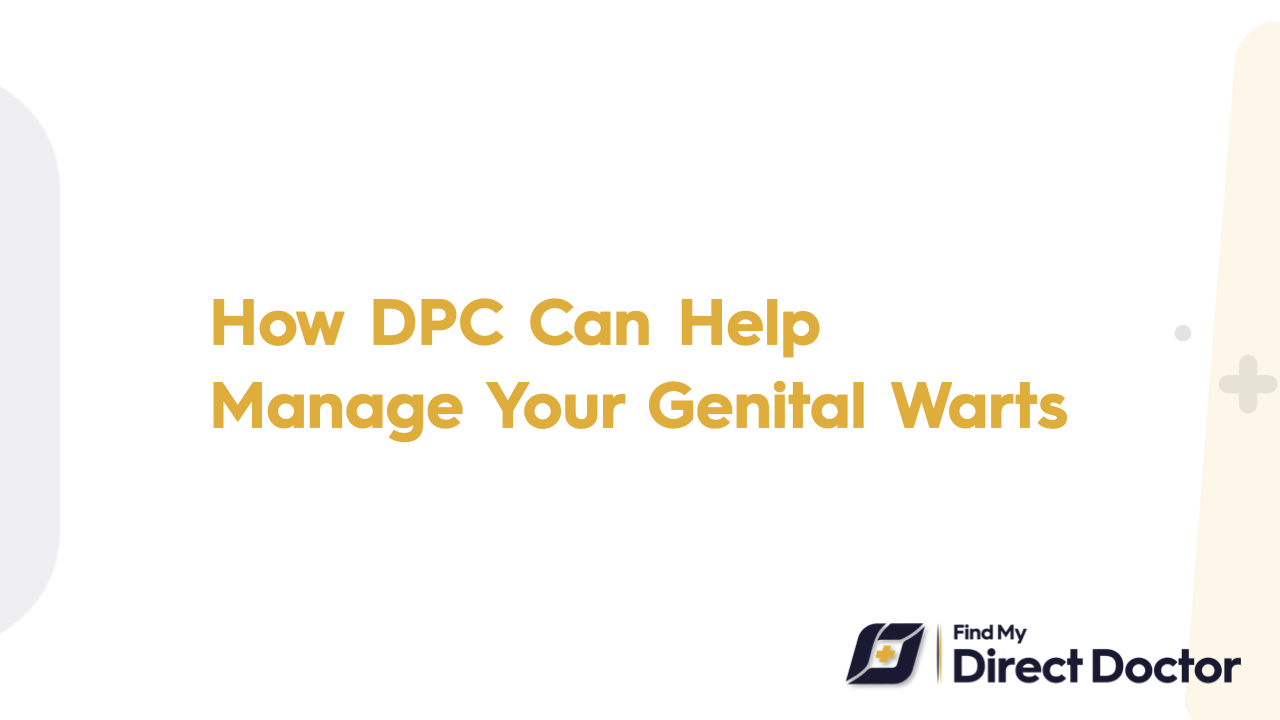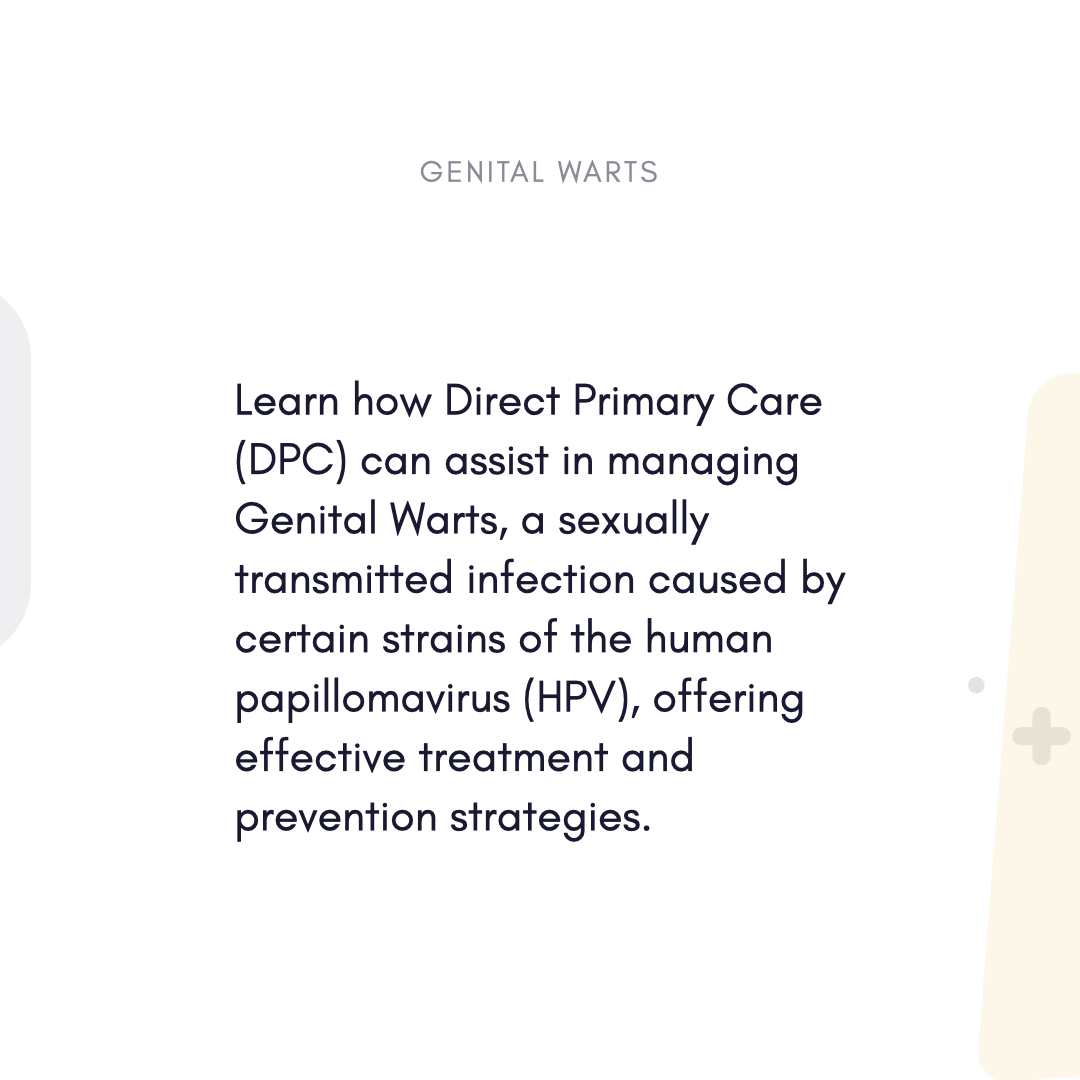Genital Warts and Direct Primary Care (DPC): Your Path to Discreet, Effective Care
You may be among the 1% of sexually active adults afflicted by genital warts if you have seen tiny, flesh-colored lumps in your anal or genital area. Driven by some strains of the human papillomavirus (HPV), this common STIs can cause anxiety, discomfort, and embarrassment. Untreated, warts might spread, grow, or raise cancer risks—e.g., those related to cervical, anal. Still, hope exists: Combining fast diagnosis, individualized treatment, and long-term prevention, Direct Primary Care (DPC) provides a confidential, patient-centered approach to treat genital warts free from insurance hassles. Let's investigate how.

Realizing Genital Warts
- Low-risk forms of HPV types 6 and 11 cause growths known as genital warts. Important knowledge:
- Transmission: During oral, anal, or vaginal sex, skin-to--skin contact.
- Complaints:
- Little, innocuous lumps arranged in clusters.
- Itching, bleeding, or pain during sex.
- Warts rarer on the throat, anus, or cervix.
- Extended risks:
- Recurrence long after therapy is over.
- More HPV passed on to partners.
- Psychological discomfort or stigma.
How DPC Changes Genital Warts Management
DPC Changes Genital Warts Management
Usually costing USD 50–150, Direct Primary Care (DPC) is a membership-based model whereby patients pay a monthly fee to have unlimited access to their provider. This means stigma-free, thorough treatment catered to your needs for those suffering with genital warts.
DPC transforms genital warts care by:
- Individualized Care Anchored in Medical Expertise:
-
- Emphasizing CDC recommendations for HPV control, DPC providers follow:
- Visual tests, acetic acid tests, or biopsies—if necessary—to verify warts are accurate diagnoses tools.
- Customized Treatments:
- Topical Therapies: For home use, imiquimod cream or podophyllotoxin.
- In-Office Procedures: Trichloroacetic acid (TCA) treatments or cryotherapy—freezing.
- Referrals for Surgery: For big or resistant warts (excision, laser treatment).
- Gardasil 9's HPV vaccination is a preventive measure to guard against next strains.
- Reasonable, Open Treatment:
- 2. Through wholesale-priced medications, DPC clinics help lower costs. Topical treatments at a pharmacy carry costs.
- In-house procedures include transparent cash price Cryotherapy or TCA treatments.
- Preventive Focus: Frequent tests and HPV vaccines help to lower recurrence.
- Ongoing Support for Emotional and Physical Well-Being:
- 3. Given 24/7 access to your doctor, you can:
- Quickly address wart recurrence.
- Talk about safe sex techniques or approaches for partner disclosure.
- Find mental health resources addressing stigma or anxiety.
Key Advantages of DPC for Genital Warts Patients
- Same-day appointments: Quick assessments for discomfort or during an outbreak.
- Discreet surroundings: No documentation proving insurance, so guaranteeing anonymity.
- Compared to conventional treatment, patients save between thirty and fifty percent when it comes to lab tests and medications.
DPC Customized Genital Warts Management
The DPC approach fits CDC guidelines for patient-centered STIs:
- Collective Decision-Making:
- Extended meetings to go over patient preferences, side effects, and treatment alternatives—e.g., imiquimod against cryotherapy.
- Instruction in HPV spread, recurrence hazards, and vaccination advantages.
- Specialized Follow-Up:
- Change treatments depending on response—for example, from topical creams to cryotherapy.
- Lifestyle coaching—that is, stress management and smoking cessation—helps strengthen immunity.
- Regular Pap smear or co-testing screenings for high-risk HPV strains help to prevent this.
- Guidance on disclosure and coordination of partner testing.
Real-Life Success Stories
- Case 1: Laura, 24, avoided clinics out of shame. Her DPC provider prescribed imiquimod cream, diagnosed genital warts, and applied cryotherapy in-office. Her warts cleared two sessions without recurrence.
- Case 2: Using DPC's wholesale pricing, 35-year-old Mark saved USD 400 on Gardasil 9 shots. His provider advised him on telling partners about HPV as well.
Frequently Asked Questions About DPC and Genital Warts
- Q: Can DPC get rid of genital warts?
- A: Agreed. DPC providers either prescribe topical treatments or apply TCA or cryotherapy.
- Q: Will genital warts return after treatment?
- A: While recurrence is normal, DPC's continuity guarantees quick retreatment.
- Q: How does DPC guarantee privacy?
- A: Share no insurance claims or unapproved records. Visits remain private.
- Q: If I already have warts, should I get the HPV vaccination?
- A: True. The vaccination guards against other high-risk HPV strains.
Why DPC Benefits Patients With Genital Warts
The American College of Physicians (ACP) emphasizes DPC's ability to raise quality by separating third-party payers from the patient-provider relationship. This translates for genital warts as:
- Fast diagnosis and treatment will help to lower discomfort and transmission.
- Holistic care combines lifestyle support with medical treatment with regard to mental health.
- Tools for confident management of outbreaks and preservation of sexual health empower one.
Take Control of Your Sexual Health Right Now
Genital warts need not ruin your life. DPC gives you a partner who values your privacy, budget, and well-being—offering professional treatment free from judgment.
All set to boldly handle warts? Look for a DPC provider close by and enjoy proactive healthcare as discreet as it is.
How DPC Especially Helps Genital Warts Patients
Rooted in accessibility, affordability, and empathy, DPC's approach directly tackles HPV control issues:
- Topical treatments, cryotherapy, and preventive vaccinations align CDC-wise.
- Stigma-Free Environment: Conversations free of judgment about sexual health.
- Regular tests and partner education help to lower spread by means of lifelong prevention.






